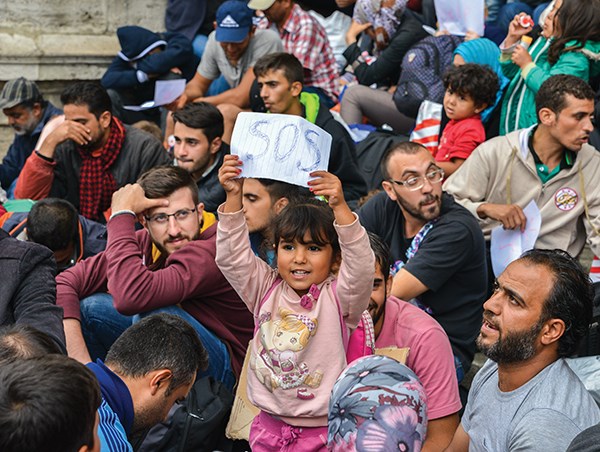Although Squamish is a paradise for many, for Syrian refugees who have been forced to flee their homes due to war, even the district’s beautiful landscapes and welcoming community won’t be enough to make it an easy transition.
“On top of the normal settlement or integration process people coming into a new community go through… refugees have trauma,” said Pam Gliatis, coordinator for the Squamish Community Adult Learning Program.
The provincial ministry of education has put out a guidebook for welcoming the refugees, in particular for youth and children.
Common behaviours manifested by refugees who have experienced trauma, especially children, include difficulty concentrating and completing tasks, fatigue because of lack of sleep, physical ailments such as headaches, vomiting or stomach aches, irritability or hyper-alertness, impaired memory, exaggerated startle responses and a preoccupation with violent events, according to Students from Refugee Backgrounds: A Guidebook for Teachers and Schools.
Gliatis said the three or more families expected to arrive in Squamish in the next four to 16 weeks will likely need trauma counselling.
“On top of it, they will have the pressures of, they are supported for a year and they will have lots of people around them to help them, but in essence they have to be on their feet pretty quickly,” she said. “In terms of work and language and adjusting to the school system, a lot of these children have not being going to school, depending on the length of time their lives have been disrupted.”
Gliatis pointed out that immigrating to a new home by choice is a very different situation from the refugees’ plight. “To be thrust into this by war and then by kind of necessity that is a whole different experience for sure,” she said.
Typically, settlement involves several stages. The first is the honeymoon stage, when refugees first arrive and may be excited and curious about their new home, according to the guidebook.
Gliatis said she imagines initially the refugees will be grateful “and relieved to be safe and have their children especially be safe.”
After about six months, the hostility stage can begin as reality sets in. “Newcomers know a bit about getting around and have begun to learn how to manage, but where they are now is not like their home: the food, appearance of things, life, places, faces, and ways of doing things are different,” the guidebook states. “Gradually, they begin to feel that they ‘hate’ their new country/situation and want to go back home.”
Next, most refugees begin to form lasting friendships and accept their new home in the coming-to-terms phase, according to the guide.
The integration phase is the final phase when refugees realize they have a new forever home. This last stage may take years, and for some will never fully take place, the guide states. “It is a situation where people will need lots of support and understanding,” Gliatis said.
She added for the larger community who may encounter the newcomers at the grocery store or other places around town, it is important to be welcoming but not nosey.
“That is going to maybe be an issue because everyone wants to know who is coming and who they are, but I think it is important for people to have a sense of privacy, of being respected.”
For Squamish organizations preparing to welcome the refugees, the process can be taxing, and there have been financial setbacks, according to Gliatis.
The Canadian federal government announced recently it will extend current contracts for settlement programs, including the Squamish Settlement Service, for one year instead of processing all the new proposals for funding that went to them last summer.
“We were hoping to hear that funding would be renewed for two years and that there would be an increase based on the numbers of immigrants we are helping in the Sea to Sky region,” said Gliatis, adding she understands the government has to focus funding on larger cities where more refugees will be headed.
The program has funding until Mar. 31, 2017, but it looks like there will be no increase in funding, “even though we will be providing support to any refugee families that come to Squamish,” Gliatis said. “This includes ESL tutoring and small group support, accessing government, health and social services, finding employment and generally supporting their integration into the community along with their sponsors.”
Therefore, the program is looking for volunteers to be trained as English-as-a-second-language tutors and to be involved in intercultural integration activities run by the Welcome Centre program. (Email [email protected] to get involved.)
A Trivia Night fundraiser for literacy programs at the Hotspot Community Resource Centre, which will be helping the arriving refugees, is planned for next Thursday, Feb. 11, from 6 to 9 p.m. at Match Eatery and Public House. For information contact Kelly McQuade 604-815-4142.
For more information on the Syrian Refugee groups go to Squamish Refugee Response on Facebook.



